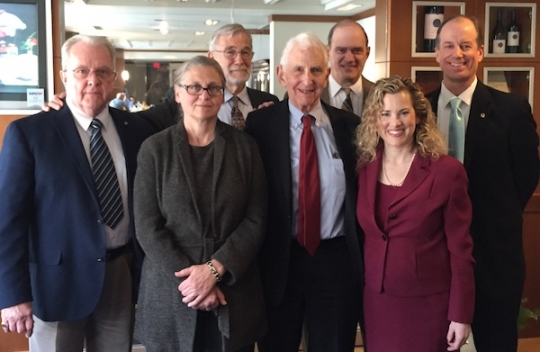 Federal Times reports today on a news conference organized by ExposeFacts.org. The piece, “Whistleblowers stand by decisions despite career fallout,” says: “Urging more people like Edward Snowden and Chelsea (formerly Bradley) Manning to come forward … federal whistleblowers said it’s important to hold government accountable in the post-9/11 world and make sure Americans are as informed as they should be.”
Federal Times reports today on a news conference organized by ExposeFacts.org. The piece, “Whistleblowers stand by decisions despite career fallout,” says: “Urging more people like Edward Snowden and Chelsea (formerly Bradley) Manning to come forward … federal whistleblowers said it’s important to hold government accountable in the post-9/11 world and make sure Americans are as informed as they should be.”
John Hanrahan, a member of the ExposeFacts.org editorial board, just wrote “Whistleblowers vs. ‘Fear-Mongering.'” The piece states: “Seven prominent national security whistleblowers Monday called for a number of wide-ranging reforms — including passage of the ‘Surveillance State Repeal Act,’ which would repeal the USA Patriot Act — in an effort to restore the Constitutionally guaranteed 4th Amendment right to be free from government spying.” [See video]
“Several of the whistleblowers also said that the recent lenient sentence of probation and a fine for General David Petraeus — for his providing of classified information to his mistress Paula Broadwell — underscores the double standard of justice at work in the area of classified information handling. …
“In a news conference sponsored by the ExposeFacts project of the Institute for Public Accuracy at the National Press Club in Washington, D.C., speakers included William Binney, former high-level National Security Agency (NSA) official; Thomas Drake, former NSA senior executive; Daniel Ellsberg, former U.S. military analyst and the Pentagon Papers whistleblower; Ray McGovern, formerly CIA analyst who chaired the National Intelligence Estimates in the 1980s; Jesselyn Radack, former Justice Department trial attorney and ethics adviser, and now director of National Security and Human Rights at the Government Accountability Project; Coleen Rowley, attorney and former FBI special agent; J. Kirk Wiebe, 32-year former employee at the NSA.”
The following participants are available for interviews:
THOMAS DRAKE, tadrake at earthlink.net, @Thomas_Drake1
Available for a limited number of interviews, Drake said he personally was “throwing my weight behind” passage of H.R. 1466, the Surveillance State Repeal Act, which was introduced by the bipartisan duo of Reps. Mark Pocan (D-Wisconsin) and Thomas Massie (R-Kentucky). According to its sponsors, the measure would remove NSA’s claimed justification for its bulk phone metadata accumulation, but would also repeal the FISA Amendments Act through which the government claims the right to spy on Internet users. The issue is coming up now because three key provisions of the Patriot Act expire later this month.
COLEEN ROWLEY, rowleyclan at earthlink.net, @ColeenRowley
Rowley centered her remarks around a statement Obama made last week in apologizing for the deaths of two hostages — an American and an Italian — in a drone strike in Pakistan. Obama, she said, opined that “one of the things that sets America apart from many other nations, one of the things that makes us exceptional is our willingness to confront squarely our imperfections and to learn from our mistakes.”
“I wish that were true,” Rowley said. “That would be nice if we learned from our mistakes,” but instead the government is going in the opposite direction in areas such as the drone program, as witness the accidental killing of the hostages. Gathering an accurate assessment of intelligence is inherently going to happen at the bottom levels of intelligence agencies, Rowley said, so employees in the lower positions have to resist someone at the top stating a desired outcome and asking people at the bottom to tailor the intelligence accordingly. She said that government officials and employees’ “highest loyalty is to the rule of law itself.” That is where whistleblowers come in.
RAY McGOVERN, rrmcgovern at gmail.com, @raymcgovern
McGovern said CIA whistleblower Jeffrey Sterling (who is to be sentenced on May 11) was convicted on “the vaguest of circumstantial evidence” in a “case that was not proven” against him. The government showed that Sterling had had telephone conversations and email communication with New York Times reporter James Risen, who had previously written about Sterling’s workplace discrimination lawsuit against the CIA — and prosecutors apparently convinced the jury that they were not discussing Sterling’s discrimination suit, but rather his knowledge of a CIA plan to provide flawed nuclear weapons blueprints to Iran.
What was the lesson any intelligence agency employee might draw from the flimsy evidence used in the Sterling case? Said McGovern: “Do not speak to journalists.” And, especially, “don’t speak to James Risen.”
Contrasting Sterling’s situation (facing a possible long prison sentence) with Petraeus (walking free, with a $100,000 fine, which McGovern noted was three-fourths of a one-hour speaking engagement fee for the general), McGovern said: “Equal justice? Forget about it.”
J. KIRK WIEBE, jkwiebe at comcast.net, @KirkWiebe
Wiebe said that the public and political response to the NSA surveillance disclosures has not been encouraging, and painted a dire picture of civil liberties abuses, the militarization of local police forces and the “de facto destruction of the Constitution.”
“I am now entering the phase where I am becoming frightened,” Wiebe said. “People have asked me, are we going to be able to get out of this mess…to turn the Titanic around?…I don’t see the way to miss hitting the iceberg.”
“We as a nation are more aware of these issues than ever before,” Wiebe said, but “we’ve become a society willing to look the other way in the face of wrongdoing,” adding: “We are no longer afraid of the police state happening. It’s here in small measures, in increasing measures, week by week, day by day…”